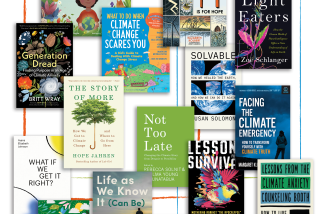‘Another Kind of Hurricane,’ ‘Drowned City’ take on Katrina
This month marks the 10th anniversary of one of the worst disasters in U.S. history: the devastation that Hurricane Katrina wrought on New Orleans, Louisiana and the rest of the Gulf Coast. Today’s middle schoolers were too young at the time to have experienced the cultural debates that raged long after the floodwaters receded. Two new books aim to introduce older kids and adolescents to Katrina, transforming shared tragedy through shared hope.
Tamara Ellis Smith’s “Another Kind of Hurricane” (Schwartz & Wade Books: 336 pp., $16.99, ages 9-12) is the story of Zavion, who loses his home during the storm’s rising floodwaters, and Henry, who loses his best friend during a hiking trip in the mountains of northern Vermont. A shared marble that is lost in a clothing donation for Katrina victims symbolizes Henry’s lost friendship. Zavion ends up with Henry’s blue jeans and the marble, and through a series of coincidences that verge on the miraculous, Henry ends up in Louisiana. The boys meet, bonding over their experiences of trauma and loss.
While this heartfelt debut novel notably celebrates the commonalities between Zavion and Henry, social differences between the boys’ worlds simmer beneath the surface. The tension finally explodes in a passage when Zavion’s mural-painter father tells off Jake, the father of Henry’s dead friend, with whom Henry has traveled to New Orleans on a charity mission.
“What do you think? That you can come down here with a few shirts and a few cans of soup and save us?” Zavion’s father says. “Well, you can’t! It’s too little! It’s too little and too late! Where were you before the damn levees broke? Where were you when they were cracked and needed to be fixed? A thousand cans of soup aren’t going to build a wall high enough to keep that water out.”
Until this point, Zavion’s father is a relatively benevolent character, as are most of the adults in the novel. Both of these men have suffered unspeakable losses, but Jake’s reaction to his own pain is not as unguarded. That creates a sense of jarring imbalance, but overall, “Another Kind of Hurricane” is an evocative read.
While Smith tries to reach middle-grade readers through prose, Don Brown turns to visuals in “Drowned City: Hurricane Katrina & New Orleans” (Houghton Mifflin Harcourt: 96 pp., $18.99, ages 12-up) Much as in his debut, “The Great American Dust Bowl,” Brown uses the conventions of graphic narrative to depict many stories during the course of the storm.
The book begins with an omniscient point of view — a map of the U.S. Gulf Coast and ominous full-page spreads of clouds — but it quickly becomes clear that nature itself is in charge. Voices of those who lived through the storm are folded into the story, from the New Orleanians who evacuated to those who were trapped in their homes. Brown is careful to show the political neglect that led to this disaster and the human toll this negligence caused.
Brown offers glimpses into the national discourse in the aftermath of Katrina, embedding a critique of officials at all levels: “The Army Corps of Engineers, the levees’ builders, had promised their walls would protect New Orleans from a hurricane of Katrina’s strength,” he writes, illustrated by a curving oil slick from a refinery tank smashed in the storm. Police officers are shown on a double-page spread abandoning their posts in the pouring rain.
The most devastating visual critiques are saved for then-President George W. Bush, flying over the drowned metropolis as evacuees wade through waist-deep water below, and then-Mayor Ray Nagin, depicted opposite a panel that shows an empty platform and an Amtrak train with an engineer reporting, “We offered … to take evacuees out of harm’s way. The city declined. Five trains leave New Orleans empty.” Although there were heroic officials who rose to the occasion, such as Army Lt. Gen. Russel L. Honoré, Brown seems content to portray heroism during Katrina as collective instead, such as the efforts of neighbors with fishing boats to help one another, and of agencies like the Louisiana Department of Wildlife and Fisheries.
“Another Kind of Hurricane” and “Drowned City” illustrate how much the people of New Orleans and the Gulf Coast suffered a decade ago because of the actions of those in power and illuminates for young readers how the actions of neighbors and friends can save the day.
Thomas is an assistant professor at the University of Pennsylvania’s Graduate School of Education and is co-editor of “Reading African American Experiences in the Obama Era.”
MORE FROM BOOKS:
Get ready to be obsessed by these 29 page-turners
27 nonfiction books you’ll want to read -- and share -- this summer
Listen up: Here are 11 audiobooks you’ll want to ‘read’ this summer
More to Read
Sign up for our Book Club newsletter
Get the latest news, events and more from the Los Angeles Times Book Club, and help us get L.A. reading and talking.
You may occasionally receive promotional content from the Los Angeles Times.






